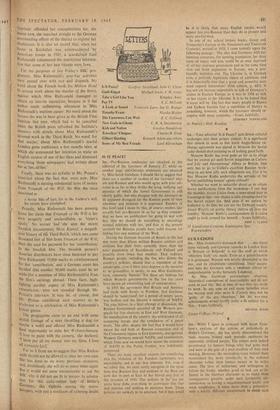Is It Peace? Geoffrey Strickland, John C. Clews Guilt - Edged Michael
Irwin, J. H. Jones
Take a Girl Like You Kingsley Ands Pay TV F. C. McLean A Look at Sound Frederick Laws, tan G. Rodger Timothy Evans Nicolas Walter The Customers Can Wait F. C. Gillman New Gods in Ghana C. R. A. Swynnerton Kirk and Nation Gordon Donaldson Travellers' Cheques Charles H. Gray Gilbert Harding Kenneth Adam and others
Some of My Best Friends Lord Ahriochum
IS IT PEACE?
SIR,--Pro-Russian tendencies are attacked in the editorial of the Spectator of January 27. while on another page anti-German tendencies are attacked by Miss Sarah Gainham. I should like to suggest that there are a number of readers of the Spectator who are anti-Russian and who would agree with your edi- torial in so far as they dislike the lying, bullying and injustice of which the Soviet Government is still clearly guilty: but who disagree with the Spectator in its apparent disregard for the Russian point of view whenever and however it is expressed. Readers of this kind (and I mean by this, of course, readers like myself) feel pro-Russian in so far as they consider that we have no justification for going to war with her, that we should do everything to encourage normal relations with her, and that at the, present moment the Russian people have valid reasons for feeling fear and mistrust of the West.
During the German invasion of Russia in the last war more than fifteen million Russian soldiers and civilians lost their lives--certainly more than the total population of Scandinavia and Finland and possibly even twice that number. That ordinary Russian people, including the few who dictate the country's policies. should fear ;a repetition of the catastrophe, even if these fears happen at the moment to he groundless, is surely, to use Miss Gainham's term, extremely 'human.' Yet these arc feelings for which Western governments in the last ten years have shown an astonishing lack of consideration.
In 1955 the agreement that Britain and America had made with Russia at Potsdam. that Germany should he 'neutralised' for a period of ninety years. was broken and she became a member of NATO. The year before, in a final attempt at dissuasion, the Russian Government accepted all the Western pro- posals for tree elections in East and West Germany, the reunification of the country. the withdrawal of all occupying troops and the conclusion of a peace treaty, The offer. despite the fact that it would have meant the end both of Russian occupation and of the Communist regime in East Germany, was ignored. Western Germany entered NATO. and reunification, which from now on would have meant the extension of NATO to the Polish frontier, was indefinitely postponed. There are many excellent reasons for considering that the violation of the Potsdam agreements was unavoidable and in our best interests: Yet, even if
we admit this, we must surely recognise at the same time that Russian fear and mistrust of the West are
now due in part at least to her hatred and fear of
the invaders of 1941. Our policies in the, last ten years have done everything to accentuate this fear
and mistrust and nothing to minimise them. These policies are unlikely to be reversed, but if they could be it is likely that many English people would appear less pro-Russian than they do at present and more pro-German.
In one of my school history books, Grant and Temperley's Europe in the Nineteenth and Twentieth Centuries, revised in 1933, I came recently upon the following passage: 'The idea that Germany with her immense resources, her teeming population, her deep sense of injury and loss, could be at once deprived of all her overseas possessions and at the same time shut out from expansion in Europe, was a pro- foundly mistaken one. The Ukraine is, in German eyes, a perfectly legitimate object of ambition, and it is historically true that a great and powerful state must expand somewhere' (fifth edition, p. 685). It has not yet become respectable to talk of Germany's claims in Eastern Europe as it was in 1938 to talk of her claims in the Ukraine. It is to be hoped that it never will be. The fact that many people in Russia and Eastern Europe fear a repetition of history is .something, however, which the Spectator should re- cognise with more sympathy.—Yours faithfully.
St. Patrick's Ilall. Reading
GEOFFREY STRICK LAND










































 Previous page
Previous page